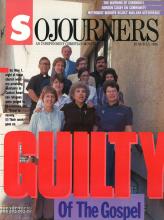Is it a sin to build a nuclear weapon? That question is becoming more and more central to the church debate on nuclear weapons, as two of the three largest denominations in the country took actions this spring that called into question the possession of nuclear weapons for deterrence.
Since 1945 deterrence in its various forms has been the philosophical cornerstone of the nuclear arms race. Each new U.S. weapon system through the years has been necessary, we were told, to maintain a credible deterrent against the Soviet threat. Variations and refinements of the theme, from "massive retaliation" to "flexible response," provided an excuse for even the most threatening and provocative advances in nuclear technology. The doctrine of deterrence has long provided the rationale for basing our entire defense policy on the insane threat of mass annihilation.
During the past six years, however, an important shift has occurred in the churches' stance toward nuclear weapons. In addition to the witness of communities of faith and resistance and the faithful stance of the historic peace churches, virtually every denomination in the United States has come out with a statement condemning the unrelenting arms race.
Yet until this year the mainstream church bodies in this country have not questioned the philosophy of deterrence. While church statements have raised moral questions about the use of nuclear weapons, the possession of nuclear weapons as part of a strategy of deterrence has been seen as a morally permissible evil. Churches have criticized everything about the arms race except the existence of nuclear weapons themselves.
Read the Full Article
